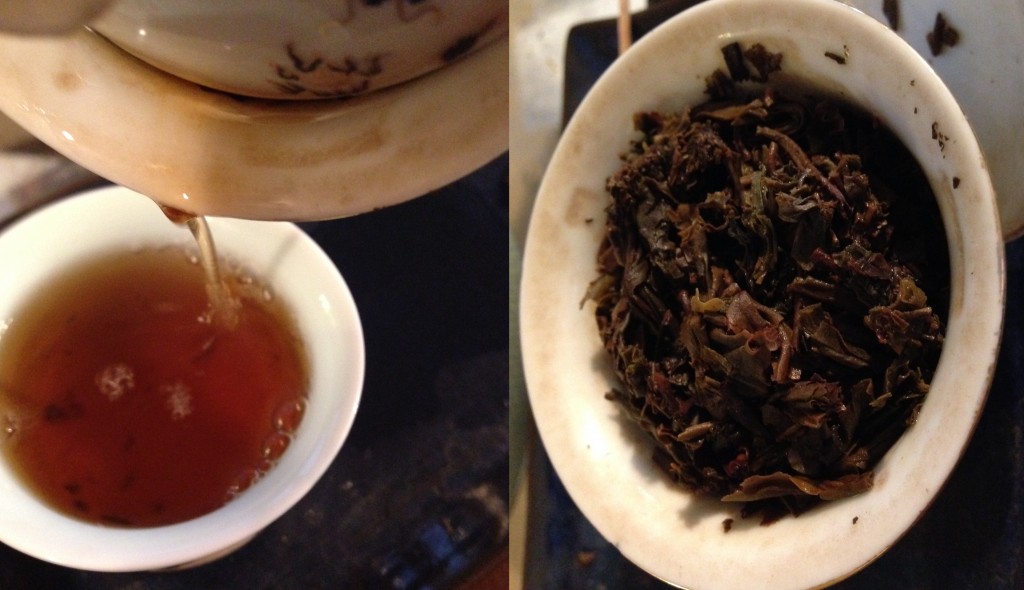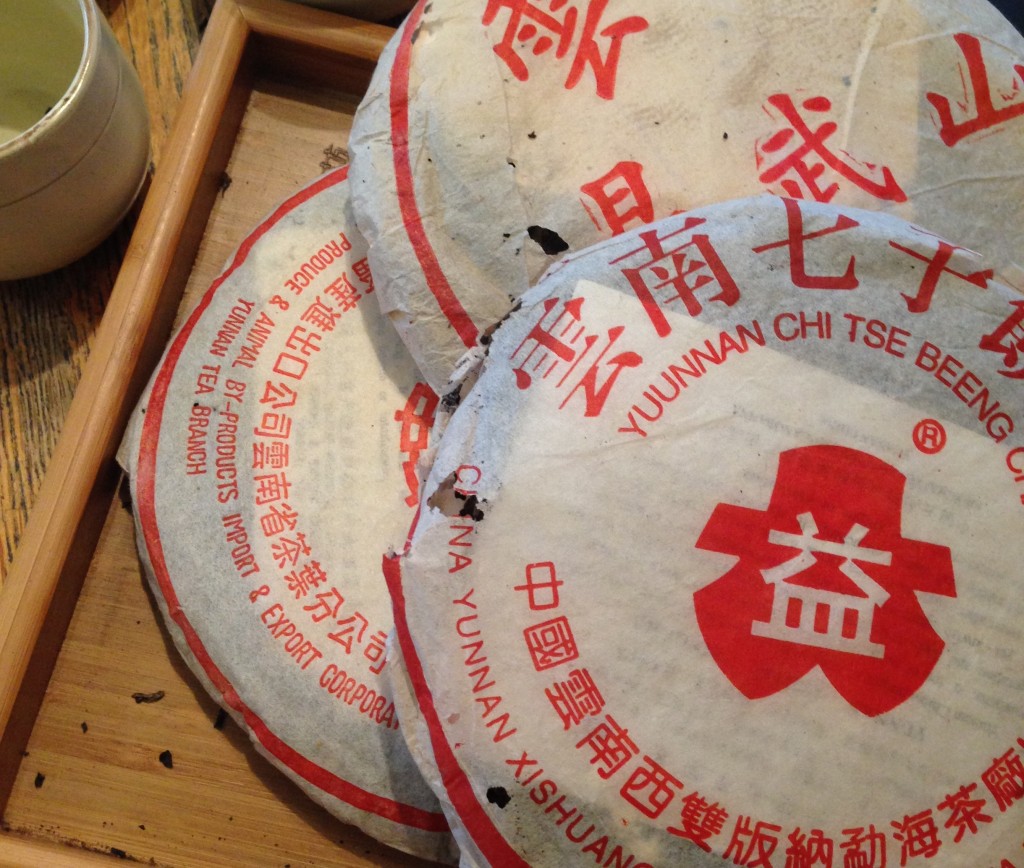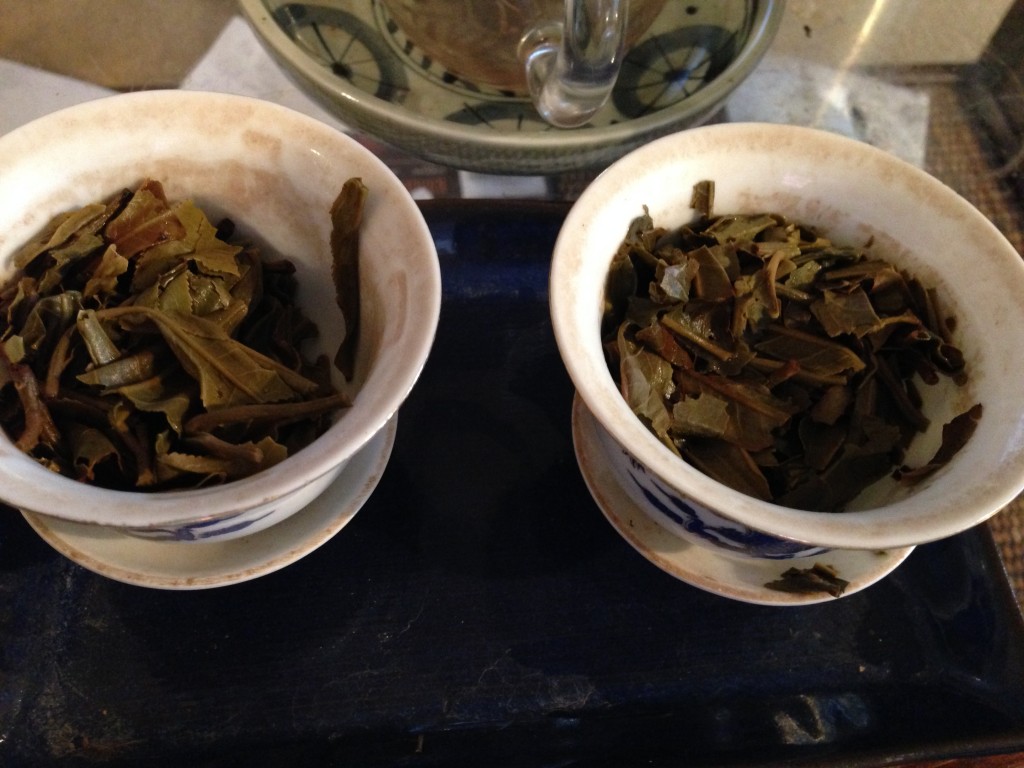In the west, tea is annoyingly difficult to separate from its health claims. Will this help me lose weight? Will this cure cancer? blah blah blah… Due to its post-fermentation, pu’erh has its own set of purported health benefits many based off its status as a chic probiotic. Most seasoned vendors and drinkers roll their eyes at these, but most everyone has their own set of beliefs on how the different types of pu’erh can affect the body. You don’t have to look much further than a tea vendor’s FAQ to find a smorgasbord of questions and answers about the supposed health benefits of tea. This article is not intended to be a health guide, nor an advertisement or critique of any particular school of thought.

Claim: Pu’erh will help me lose weight.
There’s a lot of press on pu’erh and weight loss. This is largely a western concoction that most intermediate and veteran pu’erh drinkers scoff at. Of course if you’re kicking a soda or sugary drink habit, you’ll lose some weight but this isn’t really because of the mystical, magical property of pu’erh. It’s because you’ve significantly reduced your caloric intake and replaced it with something without calories (tea). Duhh..
Claim: Young Pu’erh is Cooling to the Body & Fermented Pu’erh is Warming to the Body
The idea that pu’erh can be cooling or warming is more of an eastern claim and can be traced back to traditional Chinese medicine (TCM). Here’s a couple basics on Yin and Yang body types.. Yin is a colder body disposition. People that are Yin get cold easily and don’t usually sweat as heavily. Yang is considered a warmer constitution and is defined by more heated and aggressive qualities. Teas like ripe pu’erh would be considered warming or Yang and are considered a good balancing tea for those who are inherently cooler (yin). Conversely the colder nature of young pu’erh would be filed under the Yin type and be craved by those with Yang constitutions.
Some believe that genetically Europeans tend towards the Yang or warmer disposition, and east Asian tend to be more Yin or colder. This hypothesis would dictate that east Asians prefer more matured tea whereas westerners might be OK with the inherently coldness of young or fresh pu’erh.
Claim: The Pu’erh For You is Partially Dictated by Environment & Your Diet
When I was just about to travel to India, several people told me that it was inevitable that I’d get sick in my first few days there before my body adjusts to the diet and the climate. This claims operates under a similar concept dictated by environment and diet… In Zhang Jinghong’s Puer Tea Ancient Caravans & Urban Chic she proposes that the preferred type of pu’erh is directly tied in with the local climate and diet. A sort of synergistic relationship..
Hot and humid Hong Kong is famous for drinking boatlods of ripe and traditionally stored pu’erh. Pu’erh was traditionally consumed in Dim Sum or Yum Cha as a fermented drink to help cleanse the stomach from the copious amounts of pork fat. Their diet is also very different from the much cooler and drier Beijing where greener teas like young pu’erh and green tieguanyin are preferred. Zhang cites a couple anecdotes, where people traveled to other parts of China and initially struggling to adjust, before adopting both the diet and tea consumption.
- What’s the ideal pu’erh to compliment our ‘Murican diet of BBQ, Pizza, and Burgers? You tell me!
Claim: Moldy Pu’erh is Bad For You
This one is pretty obvious. Most everyone agrees to some extent (tea covered in rainbow-colored mold is not good for you), but there’s several different degrees here. There are those that believe that anything stored somewhat wet is moldy and undrinkable/bad for your health. A common symptom cited is a sore throat. This view is especially prevalent many places where dry-stored and young pu’erh is predominantly consumed, i.e. Kunming and Beijing. In Zhang’s book the farmers also prefer the young, fresh tea! Naysayers of this claim will often cite inexperience with older pu’erh as the cause for unnecessary skepticism.
Another common belief is that yellow, green, or whatever mold is bad and should not be consumed but white mold is OK. After all pu’erh is supposed to be alive. It’s about that good mold! Just use a tooth brush, brush it away, and chip off a piece.

Claim: Young Pu’erh is Bad For Your Stomach
This is best summed up by Marshaln in the post aptly titled stomach problems and in Hster’s post on tea reflections. There’s a belief especially prevalent amongst drinkers in southern China that drinking too much young pu’erh can irreversibly damage your stomach. Teas that have been fermented, like ripe pu’erh or matured sheng, have mellowed out and are more palatable and agreeable on the gut. Drinkers will also cite that it’s good to have food in your stomach before drinking young pu’erh.
- Along the same vein of very green teas, Marshaln has argued that Really young pu’erh is not really pu’erh as well as an argument against drinking shincha.
- There’s of course a similar argument about alcohol damaging your stomach.
Claim: Most Young Pu’erh is Bad For Your Stomach Except for Gushu
A subsection of the above claim, but arguing that there’s an exception for young gushu. They will cite the quality and purity of the base material. With lots of fake gushu flooding the market and the subjectivity of stomach trouble, this is really difficult to prove one way or the other.
- There’s also various beliefs on if truly wild material are OK to drink.
Claim: Pu’erh can go through Awkward Stages
If you are to believe every single claim here.. You would. Avoid mold.. Avoid young tea… Now, if that’s not confusing enough… There’s those that argue that there’s an awkward stage for raw pu’erh. This awkward stage is basically a stage where a pu’erh will temporarily go into a phase where it isn’t particularly pleasant to drink. This stage is most obvious in sheng that’s aged enough to lose its fresh notes but not old enough to have developed much maturity. The tea during this phase may not be great to drink. Some believe that it may just not taste good but is OK enough to drink, but there’s also those that believe that it’s bad for you.. Blegh…. Why don’t we just give up already!


Leave a Reply